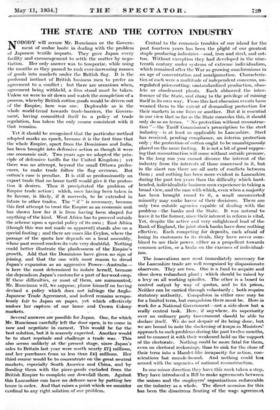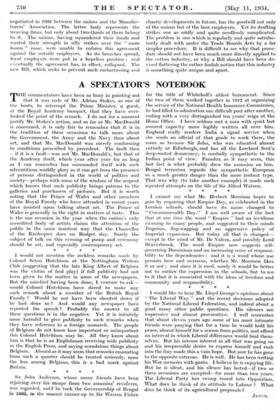THE STATE AND THE COTTON INDUSTRY
NOBODY will accuse Mr. Runeiman or the Govern- ment of undue haste in dealing with the problem of Japanese textile imports. They gave Japan every facility and encouragement to settle the matter by nego- tiation. Her only answer was to temporize, while using the months as they passed to rush ever-increasing masses of goods into markets under the British flag. It is the profound instinct of British business men to prefer an agreement to a conflict ; but there are occasions when, agreement being withheld, a firm stand must be taken. Unless we were to sit down and watch the completion of a process, whereby British cotton goods would be driven out of the Empire, here was one. Deplorable as is the whole world-trend towards trade-barriers, the Govern- ment, having committed itself to a policy of trade regulation, has taken the only course consistent with it that remains - Yet it should be recognized that the particular .method- adopted marks an epoch, because it is the first time that the whole Empire, apart from the- Dominions and India, has been brought into defensive action as though it were one economic unit. Two years ago we adopted the prin- ciple of defensive tariffs for the United Kingdom ; yet there was no attempt, beyond the small Ottawa prefer- ences, to make trade follow the flag overseas. But cotton's case is peculiar. It is still so predominantly an export trade that no home tariff would give it the protec- tion it desires. Thus it precipitated the problem of Empire trade action; which, once having been taken in its favour, is likely, if it succeeds, to be extended in future to other trades. The " if " is necessary, because this first attempt to treat the Empire as an economic unit has shown how far it is from having been shaped for anything of the kind. West Africa has to proceed outside the scheme upon a special policy of its own ; East Africa (though this- was not made so apparent) stands also on a special footing ; and there are eases like Ceylon, where the passage of the quota law depends on a local assembly, whose past record renders its vote very doubtful. Nothing could better illustrate the planlessness of the Empire's growth. Add that the Dominions have given no sign of joining, and that the one with most reason to dread Japan's expansion as an aggressive Power—Australia- is here the most determined to isolate herself, because. she dependson Japan's custom for a part of herwool-crop.. If these difficulties, or most of them, are surmounted,' Mr. Runciman will, we suppose, plume himself on having deviied a" policy which does not infringe the Anglo- Japanese Trade Agreement, and indeed remains serupu-. lonsly fair to Japan on paper, yet which effectively undoes her capture- of our home and Crown Colony markets.
• Several answers are possible for Japan. One, for which Mr. Runciman carefully left the door open, is to come in now and negotiate in earnest. This would be far the best solution, but it is scarcely expected. Another would be to start reprisals and challenge a trade war. - This also seems unlikely at the' present stage, since Japan's sales to Britain last year were worth nearly 171 and her purchases from us less than £41 millions. Her third course would be to concentrate on the great neutral markets, especially South America and China, and by flooding them with the piece-goods excluded from the British Empire to complete our downfall there. Against this Lancashire can have no defence save by putting her house in order. And that raises a point which we oonsider cardinal to any right solution of our problem. Central to the economic troubles of our island for the past fourteen years has been the plight of our greatest staple producing industrieiL-coal, iron and steel, and cot- ton. Without exception they had developed in the nine- teenth century under systems of extreme individualism, which remained after the War as growing anachronisms in an age of concentration and amalgamation. Characteris- tics of each were a multitude of independent concerns, un- regulated price-cutting, unstandardized production, obso- lete or obsolescent plantS. Each abhorred the inter- ference of the State, and clung to the privilege of ruining itself in its own way. From this last obsession events have weaned them to the extent of demanding protection for their markets in one form or another. But it is essential in our 'View that so far as the State concedes thiS, it should only do so on terms. " No protection without reconstruc- tion "—the Tariff Commission's prescription to the steel industry—is, at least as applicable to Lancashire. Steel has received, pending compliance, an interim protection only ; the protection of cotton ought to. be unambiguously.
placed on the same footing. It is not a bit of good suppos- ing that reconstruction will come without outside pressure.. In the long run you cannot divorce the interest of the industry from the interests of those concerned in it, but in the short run there are all sorts of conflicts between them ; and nothing has been more evident in Lancashire, during the past ten years than the difficulty which hard-. headed, individualistic business men experience in taking a broad view, and the ease with which, even when a majority has been brought round to it, a small unconverted minority may make havoc of their decisions. There are only two outside agencies capable of dealing with the problem—the banks and the State. It was natural to leave it to the former, since their interest in reform is vitaL Yet, despite the active and very enlightened lead of the Bank of England, the joint-stock banks have done nothing effective.. Each competing for deposits, each afraid of losing its customers to its rivals, they have never com- bined to use their power, either as a propellent towards common action, or a brake on the excesses of individual- ism.
The innovations now most immediately necessary for the Lancashire trade are well recognized by dispassionate observers. They are two. One is a fund to acquire and close down redundant plant ; which. should be raised by a levy on all working spindles. The other is a board to control output by way of quotas, and to fix prices. Neither can be carried through voluntarily ; both require statutory authority. Compulsion in either case _may be for a limited term, but compulsion there must be. Here is work for a. National :Government-toot a side-show but a really central task. Here, if anywhere, its superiority over an ordinary party Government should be able to declare itself. We do-not despair of its being done, but we arc bound to note the slackening of tempo in Ministers', approach to such problems during the past twelve months, and to connect it with their weakened hold on the support of the electorate. Nothing could be more fatal for them, even on electoral reckonings, than to sink for the close of their term into a Hamlet-like incapacity for action, con- scientious but muscle-bound- And nothing could less accord with the urgencies of national reconstruction.
In one minor direction they have this week taken a step. They have introduced a Bill to make agreements between the unions and the employers' organizations enforceable on the industry as a whole. The direct occasion for this has been the -disastrous flouting of the wage agreement negotiated in 1932 between the unions and the Manufac- turers' Association. The latter body represents the weaving firms, but only about two-thirds of them belong - to it. The unions, having squandered their funds and wasted their strength in silly strikes over the " more looms " issue, were unable to enforce this agreement against the outside employers. As its breaches spread, loyal employers were put in a hopeless position ; and eventually the agreement has, in effect, collapsed. The new Bill, which seeks to prevent such embarrassing and chaotic developments in future, has the goodwill not only of the unions but of the best employers. Yet its drafting strikes one as Oddly and quite heedlessly complicated. The problem is one which is regularly and quite satisfac- torily dealt with under the Trade Boards Acts by a far simpler procedure. It is difficult to see why that prose-: dure should not have been much more directly applied to the cotton industry, or why a Bill should have been de- vised flattering the rather foolish notion that this industry is something quite unique and apart.









































 Previous page
Previous page